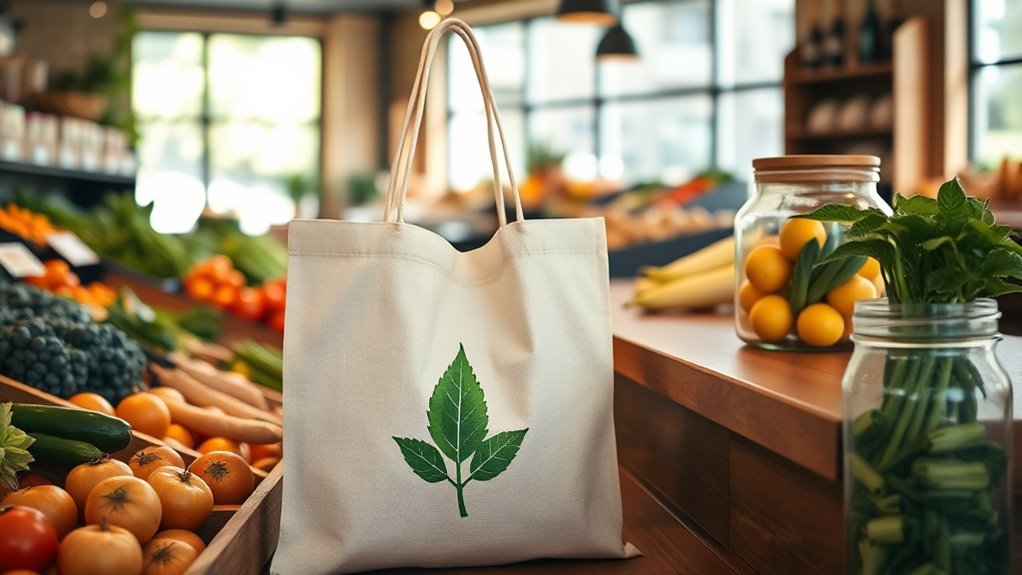To avoid greenwashing, focus on credible certifications like Fair Trade, USDA Organic, or B Corp, which verify genuine sustainability. Look beyond labels to assess transparent communications about a company’s practices and supply chain. Pay attention to eco-friendly packaging materials, such as recycled or biodegradable options, and be cautious of vague claims. Supporting responsible businesses guarantees your purchases align with your values. To strengthen your awareness and make smarter choices, explore the key signs of authentic sustainability efforts.
Key Takeaways
- Look for credible certifications like Fair Trade, USDA Organic, and B Corp to verify sustainability claims.
- Assess packaging materials to ensure they are recyclable, biodegradable, or made from renewable resources.
- Research company transparency and practices to distinguish genuine sustainability efforts from greenwashing.
- Prioritize products with transparent labeling and supply chain information for trustworthy environmental commitments.
- Educate yourself on eco-friendly materials and standards to make informed, responsible purchasing decisions.

Have you ever stopped to contemplate how your everyday purchases impact the world around you? Every choice you make, from the clothes you wear to the products you buy, carries a footprint. With increasing awareness about environmental and social issues, many companies now advertise their products as eco-friendly or socially responsible. But not all claims are genuine. That’s where understanding the importance of ethical labels and sustainable packaging becomes essential in avoiding greenwashing.
Every purchase leaves a footprint—choose ethically labeled products and sustainable packaging to genuinely support environmental and social responsibility.
When you see products with ethical labels, it’s tempting to assume they’re automatically better for the planet. However, not all labels are created equal. Some are backed by rigorous standards, while others might be just marketing tools. Look for certifications from reputable organizations like Fair Trade, USDA Organic, or B Corp, which verify that companies meet strict social and environmental criteria. These labels serve as a reliable guide, helping you distinguish truly responsible products from those that merely sport a green sticker. By prioritizing products with credible ethical labels, you guarantee your money supports businesses that genuinely care about their impact.
Another critical aspect is sustainable packaging. Companies often highlight their eco-friendly products, but if the packaging isn’t sustainable, the overall environmental benefit diminishes. Sustainable packaging involves using materials that are recyclable, biodegradable, or made from renewable resources. When you choose products with sustainable packaging, you reduce the amount of waste that ends up in landfills and oceans. Look for items packaged in materials like recycled paper, compostable plastics, or plant-based containers. These choices reflect a company’s genuine commitment to reducing plastic waste and lowering their carbon footprint. Additionally, incorporating transparent communication practices can help consumers better assess a company’s true sustainability efforts, avoiding greenwashing pitfalls. Being aware of product labeling standards can also help you identify authentic claims and avoid misleading marketing tactics. Furthermore, understanding the types of eco-friendly materials used in packaging can deepen your ability to make environmentally conscious decisions. Recognizing the importance of certified sustainable supply chains can further enhance your capacity to support genuinely responsible companies.
Frequently Asked Questions
How Can I Verify a Company’s Sustainability Claims Effectively?
To verify a company’s sustainability claims effectively, you should examine their eco label reliability and look for transparency in marketing. Research the certifying organizations behind eco labels to ensure they’re credible. Additionally, review the company’s reports and disclosures for clear, honest information about their practices. Avoid vague language and marketing hype, and seek third-party assessments or independent audits to confirm that their claims are authentic and trustworthy.
What Are Common Signs of Greenwashing Tactics?
Research shows greenwashing often involves misleading labels and vague claims. When you see a product with overly broad or generic sustainability statements, it’s a red flag. Be cautious of labels that lack certification or clear explanations. Companies may use buzzwords like “eco-friendly” without backing them up. Always question vague claims and verify details through trusted sources. Recognizing these signs helps you avoid falling for greenwashing tactics and supports genuinely sustainable brands.
Are Certifications Always Trustworthy Indicators of Eco-Friendliness?
Certifications aren’t always trustworthy indicators of eco-friendliness because they can have limitations, and third-party verification isn’t foolproof. You should look beyond a label and research the certifying organization’s standards. Sometimes, certifications may be outdated or have loopholes, so it’s wise to validate the criteria and check for transparency. Relying solely on certifications can mislead you; always dig deeper to ensure a product truly aligns with eco-conscious values.
How Do I Balance Price and Eco-Conscious Options?
Balancing price and eco-conscious options means weighing eco-friendly pricing against value versus sustainability, understanding that affordability shouldn’t compromise your environmental values. You can compare product labels, research brands’ sustainability claims, and prioritize quality over quantity. By making informed decisions, you make sure your choices support sustainability without overspending, finding that sweet spot where eco-consciousness meets budget, and recognizing that investing in durable, eco-friendly products offers long-term savings and environmental benefits.
Can Small Businesses Genuinely Practice Sustainable Consumerism?
Small businesses can genuinely practice sustainable consumerism by prioritizing ethical sourcing and supporting local impact. You can choose suppliers committed to fair labor practices and eco-friendly materials. By promoting products with transparent supply chains, your business shows its dedication to sustainability. This approach not only benefits the environment but also builds trust with your customers who value authenticity and community support. Your efforts make a real difference in creating a more sustainable future.
Conclusion
By staying informed and asking the right questions, you can steer clear of greenwashing and make genuinely eco-friendly choices. For example, if a clothing brand claims to be sustainable, look for transparent supply chains and third-party certifications. When you do your homework, you empower yourself to support truly responsible companies. Every small decision adds up—so choose wisely, stay curious, and keep pushing for honest, sustainable practices in everything you buy.









